- Home
- Marilynne Robinson
What Are We Doing Here? Page 7
What Are We Doing Here? Read online
Page 7
* * *
To what extent is reputation a factor in our beliefs, opinions, and controversies, even the weightiest of them? I am interested in Edwards as a philosopher-theologian consciously working within the intellectual tradition of New England Puritanism. He is regularly described as the best philosophic mind this continent has produced, and no one knows anything about him except that he wrote a sermon about a spider. These two facts sit oddly together. Surely his status as a philosopher and man of letters should not be overwhelmed by a single sermon of a hortatory kind common in eighteenth-century preaching. But it is. I am interested in American institutions and reforms that began in the Puritan Northeast. But, oddly enough, the states that banned and opposed slavery after the Revolution, as they could not do while they were colonies under British law, the states that advanced women’s rights and achieved levels of literacy never before seen in the world, the states that practiced the purest form of democracy yet seen in the world, are thought of as peculiarly harsh and intolerant. This stigma, based solidly and immovably on ignorance of New England culture and of the world that was its context, ought not to overwhelm its crucial contributions to what is best in American culture. But it does. Somehow we are taught to sneer, and the sneer is a final and sufficient judgment on people and things of the highest interest and importance. It has been my eccentric fate to be attracted to subjects that have been excluded from the historical conversation by an aversion of which no account can be made—so deeply has the aversion itself obscured any knowledge of the matter in question. John Calvin is an instance, of course. Why not read the most influential theologian of the Protestant Reformation, who was also the most widely read writer in England during the English Renaissance and a profound influence on American civilization, as they still say, providing no particulars, though the fact is taken to be regrettable on balance and to make our culture an object of aversion. Why not look at the Geneva Bible, Shakespeare’s Bible, and Sidney’s, Milton’s, Spenser’s, Bunyan’s—which was out of print for hundreds of years, treated as a crude production, the so-called Breeches Bible of the Puritans, though the King James Version was a virtual reprint of it, minus the scholarly and interpretive notes and with changes of translation that muted certain political implications. The King James Version appeared in 1611, at the end of Shakespeare’s career, too late to have been known or used by him. The chronology is straightforward, and still it is almost impossible to make the case that Shakespeare was not mightily influenced by a text that did not yet exist. This notion has done almost as much to sanctify the volume as anything between its covers. The English Civil Wars of the seventeenth century were the first modern revolution, precursors of the American and French Revolutions. The disorders that surrounded them set off a great migration to New England, a decisive influence on our national beginnings. Most educated Americans are unaware that there ever was a civil war in England, or a commonwealth government there. The words Calvinist or Puritan are associated with each of the things I have named, and a strong negative energy attaches to those words. So with Edwards also, who tends to be treated as if damnation were his idea. The American Puritans were the most progressive population on earth through the nineteenth century at least. They deserve notice.
All this is to prepare two points having to do with prejudices and their power, with fixed assumptions that distort our thinking gravely. First, in the old quarrel inexactly described as the conflict between science and religion, the side that associates itself with science is generally assumed to be the side of intellect and reason, as I have said. Second, the side of religion is therefore by implication a defense against both intellect and reason, a conservative nostalgia threatened by indubitable truths science has revealed to us. And these things can indeed be true of those who have undertaken religion’s defense, sadly enough. In accepting this posture, they grant the major premise of their opposition and greatly strengthen its case.
Russell, a looming figure in the early twentieth century, was an influential advocate for what is called the scientific side. He writes about the “conflict” between religion and science, beginning in the Middle Ages, writing as if scientists and theologians were easy to distinguish in those days. After all, the system that put the earth at the center of the universe was no Romish invention, no projection of religious dogma, though he writes as if it were. It was the work of Ptolemy, a second-century pagan, and was the predominant scientific view of the heavens, defended by scientists as well as by churchmen, not only because theology had grown up around it but also because with adjustments made over time it worked uncannily well. One moral to be drawn from the episode is that religion should not involve itself too deeply even with the most prestigious scientific thought, no matter how great the consensus that supports it. Russell makes much of certain remarkable theological doctrines of the time. Early sciences—alchemy, astrology, and medicine—were bizarre as well, though I am aware of no mention of the motivations of stones and paper. In any case, I just read an article about a hypothesis that would account for the empty center of our solar system, anomalous compared with the many planetary systems that have now been observed: Jupiter and Saturn drifted inward toward the sun, ground up super-earths and planetoids that would have made the system typical, then drifted back into remote space. I simplify, but elaboration would only make the tale more remarkable. If some farsighted fifteenth-century Dominican had ventured this hypothesis, it would certainly have seemed preposterous to a man writing in 1935. However wrong the Middle Ages were in the particulars, they were right in not excluding the fantastical from their notions of the true.
Russell used his learning in the science of his time opportunistically, as we can see now, when the appropriateness of analogies between human behavior and the ways of stones and paper is presumably rejected on all sides. While on the one hand the errors of science are generally honorable things, detours on the way to better understanding, on the other hand these notions of Russell’s never had the slightest grounding in reality. The prestige of science derives from the assumption that it deals in truth, fact. This is its purpose and tendency, but at no point is the purpose assumed to be fully and finally achieved. Science is, after all, a strategy, a method, not a doctrine. This is the secret of its brilliance, its rigor, its general reliability. But reason is not strictly reason when it is leveraged against a faulty inference—that is, a bad guess. The list I made earlier of the various schools of thought, considered scientific in their time, that undertook to empty the heavens and enlighten humankind by, oddly enough, demonstrating to them that they had neither self nor soul, were a series of bad guesses, not one of them the foundation upon which truly rational or scientific thinking could be based. Some of them, notably racial science and eugenics, played out in atrocities. The question of the existence of God and all the rest is not affected in any way by the ineptitude of the case made against it. The prestige of science should not be affected by the fact that it is vulnerable to misuse. But certainly historical perspective permits us to say that neither science nor reason, properly so called, was implicated in these earlier campaigns against religion. And again, a largely consistent position was maintained through all these shifts in rationalization—no God, no self. Religion could make the humanist case if its defenders were humanists. It could also make a rational and scientific case against scientism, if it were not daunted by the old habit of deference, prejudice turned against itself. The selfish gene should have been laughed off the stage years ago, and it isn’t gone yet.
I personally don’t believe that God would submit himself to proof. The very thought seems irreverent to me. I do enjoy the liberation of amazement that comes with seeing the world as the work of God, but that is another thing. On the same grounds I have no interest in claims of disproof. As characteristic as the debunking of human inwardness is the smallness of the reality posited in this scientistic worldview. If physics and cosmology are truly sciences, then there exists a body of excellent evidence that the s
cale and the varieties of Being vastly exceed anything an earlier generation could have imagined. This persuades me that reasoning about ultimate things cannot be based on the anomalous fragment of reality accessible to our awareness. The school of thought I speak of never leaves the little sphere of common sense, and indeed often adopts the rather condescending tone one takes in arguing from the stronghold of the merely obvious. I did mention Russell’s allowing for the possibility of freedom on the basis of quantum indeterminacy—an appropriately tentative conclusion based on actual, empirically demonstrated science.
Here is one of those prejudices I mentioned, the assumption that fact and reason lie always on one side of this old argument, even though over time the terms on which it has proceeded seem quaint at best, even bizarre. This prejudice seems to be held universally and to have shaped the conversation decisively. For the sake of reason and science it would be an excellent thing to examine the degree to which either of them has actually figured in this controversy. Both of them are so central in this civilization that it is crucial to try to maintain some discipline in the understanding and use of them. In the meantime, I think the whole substance of the supposed controversy could be summarized as follows: Some people believe in God and some people don’t.
Finally, that second prejudice, against humankind itself. It is striking and surely significant that denial of the reality of God is so consistently associated with a denial of attributes that historically are thought to be synonymous with human nature. The logic of this is not clear to me. Certainly the argument is made easier by the exclusion from consideration of things the species have done culturally, including, strangely enough, mathematics and science. Russell offers as fact the very familiar notion that humankind suffered a steep ontological demotion when the sun rather than the earth was accepted as the center of the solar system. If this argument was made by some religious authorities cautioning against the influence of Copernicus and Galileo, there is no evidence I know of that this was in fact its effect. We are talking about the period called the Renaissance, after all, which launched the long experiment in expanding and celebrating human capacities that has been important, even definitive, in the history of the West. In any case, it is simply strange to imagine that the status of the human race, by its own reckoning, could depend on a map of the heavens. Putting aside ancient cosmologies, skill, beauty, brilliance, wisdom, as well as accretions of power and wealth, were always seen and valued in and by human beings. Russell and others who repeat this canard seem to think that the religious authorities whom they otherwise disparage were right on this crucial point. They embrace this supposed consequence, the devaluing of humanity to the level their understanding of reality sees as appropriate.
One might suppose that a writer who considers himself an advocate for science would see a triumph of human reason in the new cosmology that would support the rising humanism of the age. Instead, as is conventional, he sees the supposedly diminished human self-esteem that he takes to be consequent upon it as another newly revealed truth—that our self-esteem had been based on an error, a failure of understanding. This is an arbitrary decision, by no means inevitable or even logical, and therefore another indication of the importance to this school of thought of belief in a diminished humankind. Then, again conventionally, Russell says that the theory of evolution, by demonstrating that we are related to the animals, lowered human self-esteem. But this is a commonplace long before Charles Darwin. When Hamlet called man the paragon of animals, when Edwards says we are distinguished from the animals by our being endowed with understanding and moral sense, they are not saying anything new. The contention that has arisen about the particulars of the creation of Adam is not relevant to the question of our being, morphologically and biologically, animals. Edwards says, “Herein does very much consist that image of God wherein he made man … by which God distinguished man from the beasts, viz. in those faculties and principles of nature, whereby He is capable of moral Agency.” Ordinary experience does suggest the legitimacy of this kind of distinction between humankind and the generality of creatures, putting aside every theory about how we came to be what we are. There are always self-professed Christians who can be roused to panic at anything remotely like an opportunity, who act as if the eternal body of Christ were under mortal threat because of some notion they find unlikable. They do much to affirm and encourage such notions. But the claim our kind make on our deep respect ought to be self-evident, together with our obligation to honor and value them. Why do religious people so often act as if respect for humankind were contingent on the interpretation of a few verses of Scripture? This tends very much to support the view that in fact human beings are not especially precious or remarkable. Does the phrase “the image of God” not imply a reality that should be manifest to our experience as Christians? For that matter, can anyone at all who has lived in a family, a community, a civilization doubt that they are, indeed, precious and remarkable?
Yes. There are sociopaths.
Exponents of the theories I have criticized are for the most part academics, who can and do, with every justification, point out that they are probably nicer than I am. But they can point to nothing in their anthropology that defines goodness or that obliges us to act on any notion of it except, tacitly, one that is conventional in society at large. Now, a given of these theories is that the norms of society and religion are artificial and oppressive, contrary to our deepest impulses and our truest nature. Their essential value is at best relativized. This is one consequence of the jettisoning of metaphysics. Edwards’s thought is loyal to a tradition that does not believe our works in this life can merit any reward in heaven. Instead, he sees whatever is good or gracious or beautiful in any human act or thought as an emanation of the divine beauty, sacredness itself. A vision like his would make any other person potentially or, in any moment, actually a revelation of the nature of God, as the brilliance of creation is also. I find this a wonderful understanding of the highest human capacities, for generosity and love, equally with intelligence and aesthetic sense—the last of these, in Edwards’s scheme, the means of our individual participation in a revelation that saturates experience, since Being itself is an emanation of God.
Other traditions articulate the felt value, even the holiness, of the highest human traits, in other terms but always with reference to eternity. These virtues endure beyond mortal life and are honored here and hereafter as a faithful anticipation of an ultimate reality. In the infinitely smaller conceptual world allowed to human existence when metaphysics is disallowed, there is no language to describe human conduct in moral terms. There is one account to be made—for generosity as for theft, for honor equally with shamelessness. Every act is at root simply a strategy of self-interest. If this is not an inevitable consequence of the exclusion of metaphysics, if it is not true necessarily that this should be arrived at as an unchangeable tenet, it is true in fact, a consistent assumption of these theories, phrenology again excluded. Exponents of these theories consider themselves to be loyal to truth and reason, at whatever cost to traditional beliefs and preferences. Truth and reason are estimable values, certainly. But is it true or rational to adhere to any one of the previous avatars of this theory? If not, then a burden falls on any subsequent version of it to prove that it amounts to more than a posture, an acculturated role or habit. Who can show me a shred of empirical evidence for the existence of anything resembling a selfish gene? The prejudice that allows these theories to claim the authority of reason and science is, among many other things, a slander on reason and science.
What will replace them? It never hurts to take a new look at things. I would be happy to recover respect for the aesthetic sense that allows human beings to act graciously and beautifully, and to be honored for their capacity to enact fine behaviors under the demands of, or in light of, the opportunities of endlessly new occasions. Let us face the truth, that human beings are astonishing creatures, each life so singular in its composition and so deep
ly akin to others that they are inexhaustibly the subject of every art. A tremendous freedom always lies behind prejudice and begins to be released the moment the errors that are the substance of prejudice are acknowledged as error. Our present world does not need to be offered cynicism as ultimate truth. It does not need new grounds for indifference to human life or contempt for the norms that discourage exploitation and violence.
The Divine
The William Belden Noble Lecture at Harvard Memorial Church: April 4, 2016
When words drop out of use, meanings go with them, perhaps. When the sense of the significant changes, language changes, or so it seems. It has been characteristic of the modern West for generations to try to move away from a vocabulary that is charged with its own intellectual and cultural history, the shift being understood as advancing thought from the pre-scientific to the scientific or from the religious to the secular, these two motives being more or less interchangeable. There is nothing especially novel in this. Quakers noticed that the days and months were named for pagan gods and dignitaries and so they numbered them instead: First Day, Second Day. The French Revolution reset the calendar to Year One and renamed the months—Germinal, Floréal—but the pretty new names could not be made to adhere, or the Quaker numbers, either. So Janus still stands at the opening of the year, Mars still brings his tempests, the emperors Julius and Augustus still lord it through our high summer. Sun and moon, Woden, Thor, and Saturn still name our days.

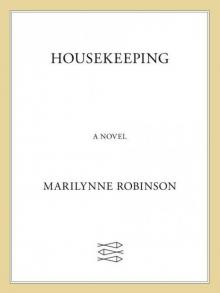 Housekeeping: A Novel
Housekeeping: A Novel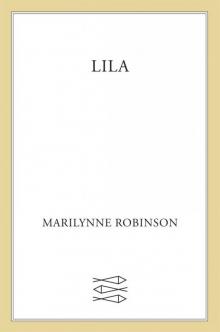 Lila
Lila Mother Country: Britain, the Welfare State, and Nuclear Pollution
Mother Country: Britain, the Welfare State, and Nuclear Pollution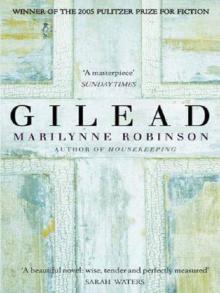 Gilead
Gilead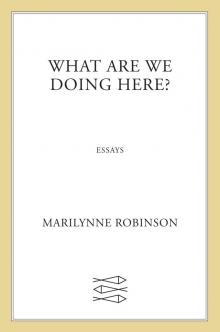 What Are We Doing Here?
What Are We Doing Here? Home
Home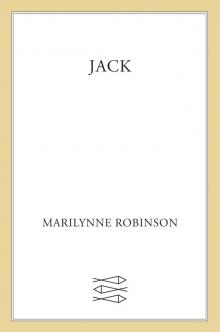 Jack
Jack Mother Country
Mother Country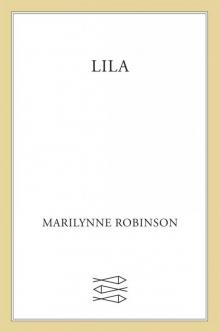 Lila: A Novel
Lila: A Novel Gilead (2005 Pulitzer Prize)
Gilead (2005 Pulitzer Prize)